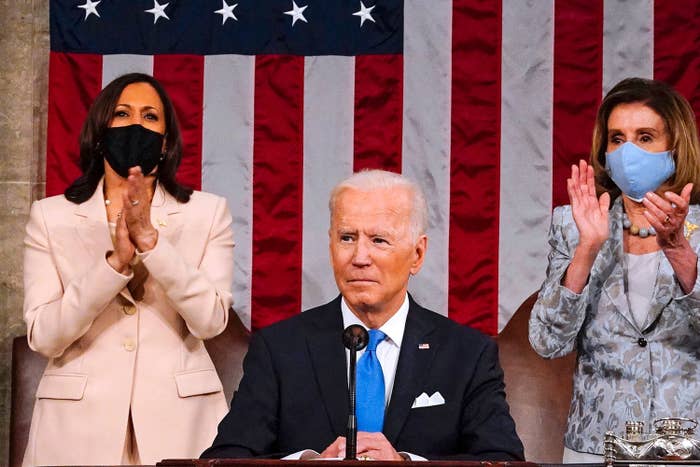
President Joe Biden made one thing clear in his first address to Congress: You don't need to stay up late in fear of missing something important from the president.
The Wednesday night speech laying out his priorities and early accomplishments was a direct contrast to the last four years of unpredictability, as Biden stuck with the vibe he’s set during the first 100 days of his administration: civil, with few surprises, even when he's pitching major change.
Biden delivered the address to a largely empty room, as attendance was limited to only a few dozen members of Congress due to the coronavirus pandemic. In his speech, the president celebrated the COVID relief package that was signed into law earlier this year and pointed to the Senate’s passage of the COVID Hate Crimes Act, a rare moment of unity in the chamber that’s been deadlocked by its even split and procedure that requires a supermajority for most legislation.
Though Biden deviated briefly at times from his prepared remarks — including, at one point, joking about deer wearing “Kevlar vests” while talking about the need for high-capacity magazine restrictions — the speech was predictable, as the president largely reiterated the plans he’s outlined for his administration during his first 100 days.
Those plans, which if enacted would spend vast amounts of money remaking much of the US economy, are not themselves boring. They're just not coming suddenly out of nowhere. And while Biden urged Congress to pass legislation focused on addressing voting rights protections, climate change, and policing reform, he stopped short of speaking about the near deadlock in the Senate that has stopped Democrats from passing their agenda.
Biden instead spent a majority of the speech pitching his plans to Republicans and asking members of the party to reach compromises and pass legislation. “Now, if Congress won’t pass my plan — let’s at least pass what we agree on,” Biden said while urging the Senate to pass immigration reform and find a compromise to protect undocumented people brought into the country as children from deportation.
The address to Congress was not devoid of big proposals, even if many of them have become familiar over the last weeks: He called for lawmakers to allow Medicare to negotiate drug prices to bring down the costs of prescription drugs, said it was time to end the “forever war” in Afghanistan, and advocated for a wealth tax on Americans making more than $400,000 per year, vowing to “crack down on millionaires and billionaires that cheat on their taxes,” while promising not to raise taxes on the middle class.
“They're already paying enough,” he said. “I believe what I propose is fair. Fiscally responsible. And it raises revenue to pay for the plans I propose and will create millions of jobs that will grow the economy and enhance our financial standing in the country."
Biden did not mention President Donald Trump by name during his remarks, making good on his promise to allow the country to think about something other than the man who sucked up so much attention for the last half-decade.
The closest he came to acknowledging Trump was a mention of the 2017 tax cuts the Republican made central to his administration.
"Look, the big tax cut of 2017, remember, it was supposed to pay for itself. That was how it was sold. And generate vast economic growth. Instead, it added $2 trillion to the deficit. It was a huge windfall for corporate America and those at the very top,” Biden said. “Instead of using the tax saving to raise wages and invest in research and development, it poured billions of dollars into the pockets of CEOs.”
Biden also spoke about the impact of the January insurrection and the impact of political polarization.
“Can our democracy deliver on its promise that all of us — created equal in the image of God — have a chance to lead lives of dignity, respect, and possibility?” Biden asked. “Can our democracy deliver on the most pressing needs of our people? Can our democracy overcome the lies, anger, hate, and fears that have pulled us apart?”
Near the end of his remarks, Biden called on Congress to pass the George Floyd policing bill by the one-year anniversary of Floyd’s death next month, just over a week after former police officer Derek Chauvin was convicted of Floyd’s murder.
“We have all seen the knee of injustice on the neck of Black Americans. Now is our opportunity to make some real progress,” Biden said, later adding the US has to “rebuild trust between law enforcement and the people they serve.”
The bill has yet to receive a vote in the Senate, and one seems unlikely, despite Democrats’ control of the chamber, as it needs 10 Republican votes to come to the floor due to the chamber’s filibuster rules.
Biden’s speech was among the longest for a first address to Congress, coming in at an hour and five minutes, tying former president Bill Clinton for the record. He concluded, in perfect Biden form, with, “Thank you for your patience.”

